Related Research Articles

Otto Wilhelm Hermann Abich was a German mineralogist and geologist who was among the first to conduct scientific studies in the Caucasus region and has been called the Father of Caucasian Geology. He worked briefly at the University of Dorpat and then travelled as part of the Corps of Mining Engineers of the Russian Empire. He collected minerals and fossils across the regions in which he travelled including Armenia, Persia, Italy and Daghestan.
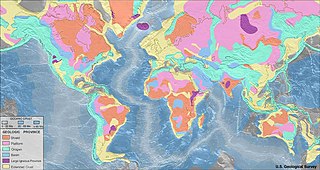
Orogeny is a mountain-building process that takes place at a convergent plate margin when plate motion compresses the margin. An orogenic belt or orogen develops as the compressed plate crumples and is uplifted to form one or more mountain ranges. This involves a series of geological processes collectively called orogenesis. These include both structural deformation of existing continental crust and the creation of new continental crust through volcanism. Magma rising in the orogen carries less dense material upwards while leaving more dense material behind, resulting in compositional differentiation of Earth's lithosphere. A synorogenic process or event is one that occurs during an orogeny.

Leopold von Ranke was a German historian and a founder of modern source-based history. He was able to implement the seminar teaching method in his classroom and focused on archival research and the analysis of historical documents. Building on the methods of the Göttingen school of history, he was the first to establish a historical seminar. Ranke set the standards for much of later historical writing, introducing such ideas as reliance on primary sources (empiricism), an emphasis on narrative history and especially international politics (Außenpolitik). He was ennobled in 1865, with the addition of a "von" to his name.

The Wollaston Medal is a scientific award for geology, the highest award granted by the Geological Society of London.
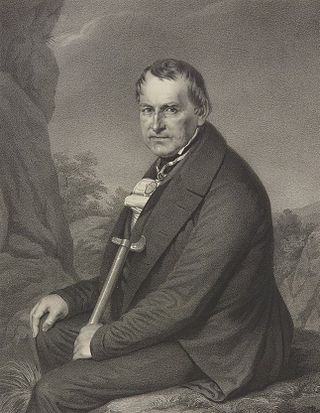
Christian Leopold von Buch, usually cited as Leopold von Buch, was a German geologist and paleontologist born in Stolpe an der Oder and is remembered as one of the most important contributors to geology in the first half of the nineteenth century. His scientific interest was devoted to a broad spectrum of geological topics: volcanism, petrology, fossils, stratigraphy and mountain formation. His most remembered accomplishment is the scientific definition of the Jurassic system.

The Geological Society of America (GSA) is a nonprofit organization dedicated to the advancement of the geosciences.
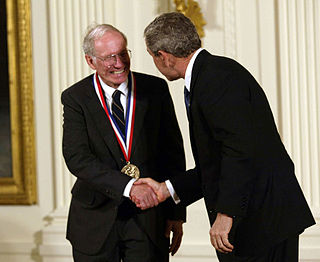
William Jason Morgan was an American geophysicist who made seminal contributions to the theory of plate tectonics and geodynamics. He retired as the Knox Taylor Professor emeritus of geology and professor of geosciences at Princeton University. He served as a visiting scholar in the Department of Earth and Planetary Sciences at Harvard University until his death.
Walter Hermann Bucher was a German-American geologist and paleontologist.
The Murchison Medal is an academic award established by Roderick Murchison, who died in 1871. First awarded in 1873, it is normally given to people who have made a significant contribution to geology by means of a substantial body of research and for contributions to 'hard' rock studies. One of the closing public acts of Murchison's life was the founding of a chair of geology and mineralogy in the University of Edinburgh. Under his will there was established the Murchison Medal and geological fund to be awarded annually by the council of the Geological Society of London.
The Bigsby Medal is a medal of the Geological Society of London established by John Jeremiah Bigsby. It is awarded for the study of American geology.

Tanya Atwater is an American geophysicist and marine geologist who specializes in plate tectonics. She is particularly renowned for her early research on the plate tectonic history of western North America.
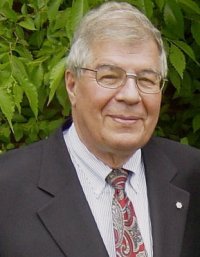
Raymond Alexander Price, is a Canadian geologist. He has used his research on the structure and tectonics of North America’s lithosphere to produce extensive geological maps. He has also provided guidance for nuclear fuel waste disposal and reports on the human contribution to Global warming.

Alfred Kröner was a German Professor of Geology at Johannes Gutenberg University of Mainz in Mainz, Germany. He specialized in the Precambrian geology of Africa and geology of China but worked on many other geologic problems around the world. His research focused on the tectonics of the continental crust, geochronology, geochemistry, palaeomagnetism, structural geology, and petrology. He was especially interested in the Precambrian and Palaeozoic evolution of the continental crust.
Verlag für Geowissenschaften Berlin is a German scientific publisher of titles relating to the geological sciences, founded in 1998. It was originally established as a publishing arm associated with a learned society devoted to the history and historiography of geological research, the Verein Berlin-Brandenburgische Geologie-Historiker "Leopold von Buch" co-founded the same year by the noted historian of natural sciences at Rostock University, Martin Guntau. The publisher's offices were initially based in the borough of Pankow, East Berlin, later relocating to Ahrensfelde in the adjoining Landkreis (district) of Barnim in the German state of Brandenburg. The publisher and director since its founding is Ulrich Wutzke.
Heinrich Dieter 'Dick' Holland was an emeritus professor in the Earth and Planetary Sciences department of Harvard University. He made major contributions to the understanding of the Earth's geochemistry, especially large-scale geochemical and biogeochemical cycles. He has also contributed to the field of planetary chemistry and planetary evolution.
John Clements Davis is an American geologist best known for his research in the application of statistics to geology. He spent almost his entire professional career with the Kansas Geological Survey, being an Emeritus Scientist since 2003. He then served as Univ-Prof of Reservoir Characterization at the Montanuniversität in Leoben, Austria and is now Chief Geologist for Heinemann Oil GmbH in Austria.
Davis has been a member of several professional societies, most active in the International Association for Mathematical Geosciences, where he was Editor of the Newsletter (1973–1989), Western Treasurer (1972–1980), Secretary General (1980–1984), President (1984–1989) and Distinguished Lecturer (2002). The Association acknowledged his valuable contributions to the organization and science by presenting him with the Krumbein Medal. Davis also received the Haidinger Medal from the Geologische Bundesanstalt for his contributions to mathematical geology.
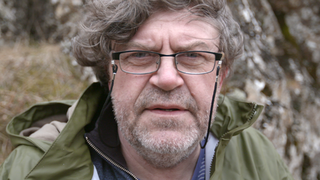
Trond Helge Torsvik is a Norwegian professor of geophysics at the University of Oslo. He directs the Centre for Earth Evolution and Dynamics. In 2015 Torsvik received the Leopold von Buch award for his outstanding contributions to the understanding of geodynamics. The prize is awarded by the German Geological Society. In 2016 he also received the Arthur Holmes Medal & Honorary Membership from the European Geosciences Union.
Pulak Sengupta is an Indian petrologist and a professor and former head of the Department of Geological Sciences of Jadavpur University. He is known for his studies on grain-scale reaction mechanism and ultra-high temperature regional scale metamorphism and his studies have been documented in several peer-reviewed articles; ResearchGate and Google Scholar, online repositories of scientific articles, have listed 31 and 60 of them respectively. Besides, he has contributed chapters to many books published by others. He has also mentored doctoral scholars in their studies.
William Winn Hay was an American geologist, marine geologist, micropaleontologist, paleoceanographer, and paleoclimatologist, primarily associated with the University of Colorado.
The elevation crater theory is a now-discredited geologic theory originating in the 18th and 19th centuries which intended to explain the origin of mountains and orogens, holding that mountains formed by vertical movements associated with volcanism.
References
- ↑ "Brian Windley". ResearchGate . Retrieved 2 February 2022.
- ↑ Alfred Kröner (2016). "Leopold-von-Buch Medal awarded to Brian F. Windley" (PDF). German Geosciences Society. Retrieved 2 March 2024.
- ↑ Windley, B.F. (1977). The Evolving Continents. John Wiley and Sons, New York. pp. 1–385. ISBN 9780471994763.
- ↑ Windley, B.F. (1995). The Evolving Continents, 2dn ed. John Wiley and Sons, New York. pp. 1–399. ISBN 0471903906.
- ↑ Windley, B.F. (1995). The Evolving Continents, 3rd ed. John Wiley and Sons, New York. pp. 1–526. ISBN 0471917397.
- ↑ "Ehrungen und Preise" – via German Geosciences Society (DGGV.de).
- ↑ "Brian Frederick Windley". Google Scholar . Retrieved 2 February 2022.